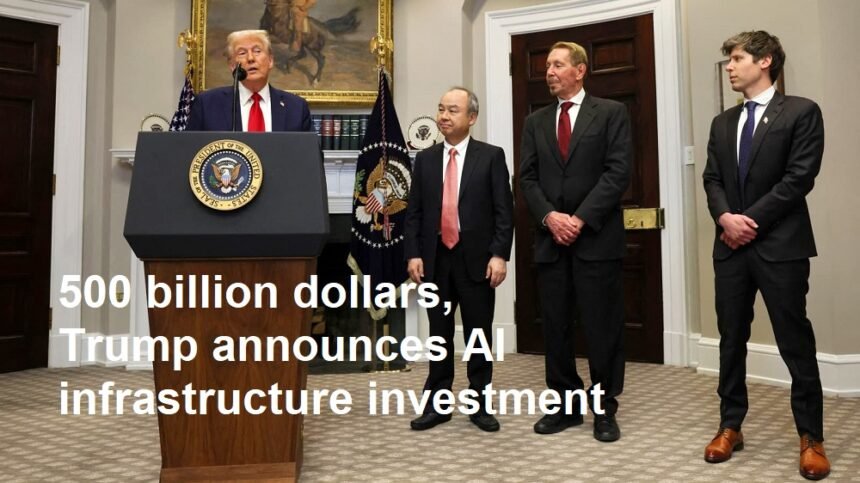U.S. President Donald Trump has recently announced a groundbreaking initiative to invest in America’s infrastructure, with a focus on integrating artificial intelligence (AI) to modernize the nation’s critical systems. The ambitious project, which is backed by some of the biggest names in the tech industry—including Oracle, SoftBank, and OpenAI—aims to overhaul the country’s infrastructure with cutting-edge AI technologies. The initiative promises to transform a wide array of sectors, from transportation to energy management, healthcare, and urban development, boosting both the economy and national competitiveness.
Trump’s announcement details a $500 billion initiative aimed at improving the United States’ infrastructure by integrating AI solutions into key areas. The president outlined how the integration of AI technologies could create smarter, more efficient infrastructure systems across the country. His vision involves using AI to optimize transportation networks, streamline energy distribution, enhance healthcare systems, and even create more sustainable cities.
At the heart of the initiative is the belief that AI can bring about vast improvements in efficiency, cost-effectiveness, and sustainability. Trump emphasized that this project will not only revitalize aging infrastructure but also position the U.S. as a global leader in AI-powered technological solutions.
To make this transformative initiative a reality, Trump has secured backing from three of the most prominent companies in the technology sector: Oracle, SoftBank, and OpenAI. Each of these companies brings unique expertise that will be crucial in the success of the project.
Oracle, a global leader in database management and cloud computing, will provide the infrastructure needed to handle the massive amounts of data generated by AI systems. The company’s advanced data analytics and cloud solutions will be essential in processing real-time information to optimize the efficiency of AI-powered infrastructure.
SoftBank, a multinational conglomerate known for its investments in technology, robotics, and telecommunications, will play a pivotal role in funding the project. SoftBank has a track record of investing in high-growth, disruptive technologies, and its involvement ensures that the $500 billion initiative will have the necessary financial backing to achieve its goals.
OpenAI, one of the foremost research organizations in the field of artificial intelligence, will contribute its advanced AI technologies to the project. Known for developing cutting-edge AI models, such as GPT-3 and DALL-E, OpenAI’s expertise in machine learning and deep learning will be essential in creating the AI systems that will drive innovation in infrastructure sectors like transportation, energy, and healthcare.
The integration of AI into U.S. infrastructure has the potential to revolutionize several sectors, improving the quality of life for citizens and enhancing the efficiency of public services.
- Transportation: AI-powered traffic management systems could reduce congestion, optimize public transportation routes, and enhance road safety. Furthermore, the development of autonomous vehicles could reduce accidents caused by human error and revolutionize the way goods and people are transported.
- Energy: AI can be used to manage energy distribution more effectively. Smart grids powered by AI would allow for more efficient energy usage, reducing waste and lowering costs. AI could also be pivotal in integrating renewable energy sources into the grid, making the U.S. more energy-independent and environmentally friendly.
- Healthcare: The use of AI in healthcare could streamline diagnostic processes, enhance treatment accuracy, and improve patient care. Machine learning algorithms could be used to predict disease outbreaks, optimize resource allocation in hospitals, and even assist doctors in making more accurate diagnoses.
- Smart Cities: By incorporating AI into urban planning, cities could become more sustainable and efficient. AI-powered systems could optimize waste management, water usage, and building energy consumption, contributing to a cleaner and more sustainable urban environment.
Trump’s announcement is not just about infrastructure; it is also about ensuring that the United States remains competitive in a rapidly evolving global economy. With countries like China making significant strides in AI and infrastructure development, this $500 billion investment aims to position the U.S. as a global leader in AI innovation.
Moreover, the project is expected to create millions of new jobs across various sectors, including AI development, engineering, and infrastructure management. The economic benefits could be far-reaching, as AI-powered systems could reduce inefficiencies, lower operational costs, and boost productivity across industries.
On the geopolitical stage, the project could strengthen U.S. technological leadership and reduce dependency on foreign sources for critical infrastructure. By investing in its own technological capabilities, the U.S. could not only enhance its domestic infrastructure but also solidify its position as a global AI powerhouse.
While the initiative has garnered significant support, it has also raised several concerns. Critics argue that such a large-scale project could face implementation challenges, including regulatory hurdles, the need for significant workforce retraining, and potential resistance from communities impacted by changes in infrastructure.
There are also concerns about privacy and data security. With AI systems collecting and processing vast amounts of data, ensuring the protection of personal and sensitive information will be critical. Additionally, the automation of certain jobs through AI could lead to workforce displacement, and the government will need to address the potential social and economic impacts of this shift.
Donald Trump’s announcement of a $500 billion AI infrastructure initiative, supported by Oracle, SoftBank, and OpenAI, represents a bold vision for the future of U.S. infrastructure. By leveraging the power of artificial intelligence, the project aims to modernize the nation’s aging systems, making them more efficient, sustainable, and competitive in the global economy. While the initiative faces significant challenges, it also has the potential to reshape the future of American infrastructure, create millions of jobs, and solidify the U.S.’s leadership in AI and technological innovation.












